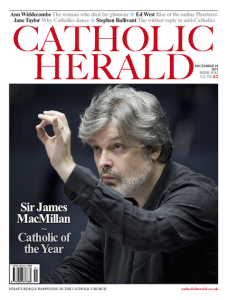When Pope Benedict entered Westminster Cathedral for Mass during his English visit in 2010, the Entrance Song was the “Tu es Petrus,” composed by the recently knighted Scot composer, Sir James MacMillan. As the ruins of many cathedrals there still attest, Scotland was once Catholic. Some clans remained so. What was the poignant line of Samuel Johnson in his Journal of a Tour in the Hebrides? –“That man is little to be envied whose patriotism would not gain force on the plain of Marathon, and whose piety would not grow warmer among the ruins of Iona.”
MacMillan was awarded the “Catholic Herald’s Catholic of the Year, 2015.” He is an admirer of Benedict XVI, who also places music and beauty at the core of human life. “Beauty is the heart of our Christian faith,” MacMillan wrote. “It should be paramount in our attentions as we approach the throne of all Beauty for our praises.” The Church long understood that men need beauty as much as they need bread, perhaps, in the long run, they need it more.
In The Ratzinger Report (1985), we read: “Christianity is not a philosophical speculation; it is not a construction of our mind. Christianity is not ‘our’ work; it is a Revelation; it is a message that has been consigned to us, and we have no right to reconstruct it as we like or choose.”
Popes and bishops have no more important task than to keep the essential “message” intact. “Philosophical speculations” only follow upon and aid the accurate reception of revelation and its content. Any attempt to “reconstruct” it or tone it down in the light of some fancied “construction” of the mind is itself to reject what has been “consigned” to us. It is this latter consignment, however unpopular or alien to a given culture or era, that God wanted to be kept present in the world down the ages – and entrusted the Church to carry it out.
Sir James MacMillan put it this way: “Many people, believers or not, have invested a lifetime in trying to water down Christianity, seeing a bland uniform secularism as some kind of inevitable next step. We do live in a plural society, but our civilization has been shaped by Judaeo-Christian values and culture. Some of us will continue to celebrate this and live our life of faith as pluralists.” One can hardly doubt that much of modern Protestantism and liberal Catholicism have indeed spent “lifetimes” in “watering down” the basic tenets of revelation and the reality to which they refer.
The effort to “water-down” Christianity into a “bland uniform secularism” would make the Church an agent of cultural uniformity. The things that make Christianity distinct – its very revelation of Trinity and Incarnation – would be eliminated or explained away. This revelation and its distinctness, indeed, are popularly said to be the “cause” of our civil disorders. No one, then, can claim to be bound by anything but what the state allows for public peace. A universal “humanism” or “secularism” endeavors to eliminate any cause of strife. The Church thus can claim no effect outside its own walls. Religious freedom ends at the front door of any religious congregation.
The kind of “pluralism” that Sir James MacMillan follows is a more robust kind than the “multiculturalism” according to which we currently are ruled. Modern “multiculturalism,” the kind that Sir James rejects, is based on skepticism. Nothing in principle is true. All religious ideas are equally wrong. None can claim truth.
In the “pluralism” of Sir James MacMillan, differences in thought and ideas are not to be hidden but to be lived openly and legally. Often, to do so, it takes considerable “courage”—itself, no doubt, an historical Scot virtue. How often have the haunting bagpipes of the Scot regiments conveyed this virtue in many a strange land.
The idea that peace is achieved by the forceful removal of any sign of religion, in effect, establishes “secular humanism” as a mandatory “public faith,” all of this in the name of “multiculturalism.” Such a concept has, as it turns out, proved as lethal and as narrow as almost any past religion. Its justification, again, is the claim that nothing is true.
With Benedict, Sir James understands that his pluralism is rather based on reason. It does not deny the fanaticism in some religions that needs to be met head on. But it likewise affirms that what is revealed is to be known and lived. These are the truths that he will “continue to celebrate” and stand for within the nations, beginning with his own land.
Finally, let me repeat, with Joseph Ratzinger: “Christianity is not ‘our’ work; it is a Revelation.” And with Sir James: “Beauty is the heart of our Christian faith.”
Click here to listen to Sir James MacMillan’s “Tu es Petrus”
















